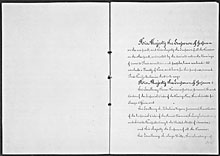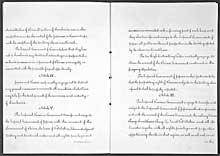
Peace, Part Three - September 5, Tuesday: Treaty Signed
At about 3:30 p.m., on September 5, in the naval stores building at the Navy Yard, the envoys met for the last time to sign the treaty. The Russians, and then the Japanese signed four copies of the document (two in English, two in French).
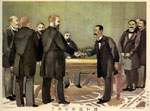
Witte and Komura shake hands after signing the treaty. View larger image.
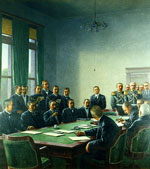
Witte signs treaty as Komura looks on. Courtesy of The Memorial Picture Gallery at the Meiji Jingu Shrine. View larger image.
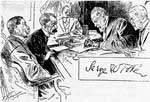
Komura, left, watches Witte sign the treaty documents on September 5. In the background is Secretary Peirce. No photographers were permitted in the conference room but a member of the Russian delegation made this sketch which was forwarded to St. Petersburg and distributed to the foreign press. From Lietopis Voiny's Yaponye (Chronicle of the War with Japan). View larger image.
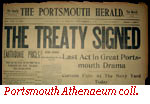 Treaty Signed. The witnesses to the signing were Secretary Peirce, Portsmouth Mayor Marvin, Governor McLane, Rear Admiral Mead, Commandant Winslow of the Mayflower and Lieutenant Commander Gibbons of the Dolphin. The signings were completed at 3:47 p.m. according to the Herald.
Treaty Signed. The witnesses to the signing were Secretary Peirce, Portsmouth Mayor Marvin, Governor McLane, Rear Admiral Mead, Commandant Winslow of the Mayflower and Lieutenant Commander Gibbons of the Dolphin. The signings were completed at 3:47 p.m. according to the Herald.
Everyone was silent during the signing but when Witte finished, he tossed his pen aside and stood, reached across the table to shake hands with Komura. The rest of the conferees followed his lead, and then Rosen made a short speech of gratitude to the Japanese in which he hoped that every effort would be made to maintain friendly relations between the countries. Komura responded in a like manner, pledging to do everything that he could to insure “a treaty of peace and amity.”
With the local populace, to say nothing of the rest of the world, eagerly waiting the outcome of the signing, “One of the secretaries of the Russian mission by a prearranged signal gave the information to a corporal of marines, who was standing just outside the door of the conference room. On the dead run across the hall and down the stairway he rushed to the big doorway of the stores building and thus called to Captain Jefferson Rowe, a one-armed officer who had been anxiously waiting.
“All right, Cap!’
“With his one arm, Cap waved a red signal flag and BOOM, BOOM, BOOM went the guns, the first notice to thousands in the immediate vicinity that the treaty had been signed.” Church bells rang in Kittery Point, Portsmouth, and New Castle.
Meanwhile, the men adjourned to the dining room for a brief reception. The only woman known to be present was Sarah Jane Farmer of Green Acre, so honored for her devotion to world peace. For some reason, there were no champagne glasses but a call to the Rockingham resulted in a quick delivery of glasses by automobile. Several toasts were offered, including one to the city of Portsmouth.
Mayor Marvin shared his observations of the last session with the Herald’s readers: “M. Witte signed the treaty with his own fountain pen which he returned to his pocket after using it. Along the sides of the table in the conference were, at least, two-dozen pens and Baron Komura, when he signed the first copy of the treaty used one of these, a common wooden handled pen, with a cork finger guard. He laid this down and when next called upon to sign his name used another. In the signing of the copies of the treaty and the protocol, Baron Komura wrote his name eight times and used six or seven pens. Baron Rosen and Mr. Takahira also used pens from the table. One of the pens thus used was given to me. After all the business in the conference room had been concluded, we were invited to a daintily prepared lunch in another apartment.
Here the greatest good fellowship prevailed. Toasts were drunk to Russia, Japan, the members of the embassies, to Portsmouth and to a great number of other persons and places. M. Witte passed up and down both sides of the table touching his glass to those of every person present. Baron Rosen proposed to me a toast something like this: May Portsmouth continue to prosper and always be as beautiful and as hospitable as she has been during the peace conference. Baron Komura was somewhat less effusive but he also spoke very kindly of Portsmouth.”

Final page of the Treaty with the signatures of Witte, Rosen, Komura, and Takahira. View larger image.

